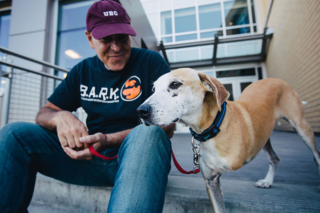Lessons Learned From a 3-Legged Rescue Mutt
The University of British Columbia (UBC) has a large and well-established therapy dog program and among the cast of canine characters who participate in student stress-reduction programs, there’s a three-legged rescue mutt named Craig (his daily antics can be seen on IG @craigtherescue). As a street dog in Mexico, he dragged around a broken leg; begging for food wherever he could get a handout. His life has changed considerably since his days on the street and though his facial scars and missing limb are reminders of his life past, the life he leads now is in stark contrast to his early days. He rolls up to campus in a bougie ride, his best buddy is a three-legged former meat dog from Taiwan, and to reduce wear and tear on his one front leg, he rides in a wagon when out for walks.
In a world where pandemic designer puppies abound and I see new dog-human relationships being established around me, I’ve reflected on my relationship with this three-legged Mexican rescue mutt—my sidekick for the last four years. My advocacy for adopting rescue dogs aside, we’ve a lot to learn from all dogs and this is a quick summary of some of the lessons learned from Craig, a rehabilitated street dog.
I’m fortunate in my role as the director of UBC’s Building Academic Retention through K9s (B.A.R.K.) program that I’m surrounded by dogs and that a good portion of my professional life is devoted to facilitating access to therapy dogs to reduce stress. The musings that follow reflect a work and personal life accompanied by Craig, faithfully hopping by my side to faculty meetings and around our neighborhood.
1. Lead with confidence
From the moment I opened his kennel door at the airport after his flight from Mexico to Canada, he looked to me for leadership—for that sense of direction that I would lead him with confidence as we ventured forward. I’m regularly reminded of the importance of leading Craig confidently, especially as we enter new elevators, navigate busy intersections, or meet enthusiastic students on campus eager to learn about Craig and his story. Craig monitors me and takes my temperature of situations as a gauge for determining his comfort level. He looks to me for direction—constantly. Lead your dog with confidence.
2. Keep your behavioural expectations high
I can’t speak on behalf of other folks with rescue dogs, but I think there’s perhaps a belief that the (possible) trauma experienced by rescue dogs restricts their ability to adapt, learn, and govern themselves in the world. From day one, I’ve had high expectations for Craig. His physical limitations aside, he’s to be a gentleman in public, keep his neuroses in check, and to be a K9 ambassador when we’re working on campus. This requires regular reminders to wait and be patient, the occasional treat as a reward to encourage desired behaviour, the regular learning of new skills, and a constant monitoring of his behaviour. I’m always mindful of the behaviour I’m encouraging in Craig as it’s my role to shape and guide his conduct, especially in public. Support your dog in achieving high expectations.
3. Observe the friendships your dog establishes—these are good people
Your dog is a good judge of character and you’d be wise to pay attention to the people your dog determines are worthy of friendship. Craig forges new friendships but is not quick to buddy up with just anyone. I’m not sure just what he uses to determine who merits his friendship, but once he aligns with someone, he’s all in. As part of our regular haunt on campus, Craig has friends he needs to check in on (including my boss!). Notice your dog’s friendship network.
4. Dogs teach us about resiliency and about ourselves
I often will hear “You go Craig!” as we’re walking about the campus. Craig’s physical struggles serve as an example and reminder to keep forging forward despite the hurdles and obstacles we face. If a three-legged former street dog can face the day with his tail wagging, we can all put our best foot forward. Match your dog’s enthusiasm for life.

